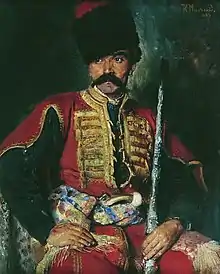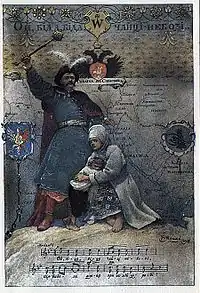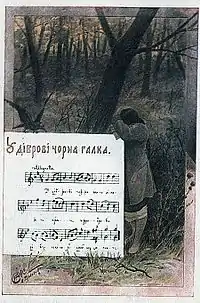Cossack songs
Cossack songs are folk songs which were created by Cossacks.

Dnipropetrovsk region, Ukraine
| Cossack’s songs of Dnipropetrovsk Region | |
|---|---|
| Country | Ukraine |
| Domains | performing arts |
| Reference | 01194 |
| Region | Europe and North America |
| Inscription history | |
| Inscription | 2016 (11.COM session) |
Dnipropetrovsk Cossack songs (Ukrainian:Козацькі пісні Дніпропетровщини), the Zaporozhian Cossacks songs of the Dnipropetrovsk region, are listed as an intangible cultural heritage in need of urgent protection.[1][2][3] Cossack songs traditionally involve male singing.[4] Cossack songs are nowadays often performed by women, but rarely in mixed groups. UNESCO's list mentions the choral groups Krynytsia, Bohuslavochka, and Pershotsvit.[5][6]
List of Intangible Cultural Heritage
2014 in Dnipropetrovsk region began the initiative group of nomination dossier for inclusion of Cossack songs into the UNESCO Intangible Heritage List. On November 28, 2016, the Committee for the Protection of Intangible Cultural Heritage List included Cossack songs of the Dnipropetrovsk region on the List of Intangible Cultural Heritage in need of urgent protection. According to the committee, these works, sung by Cossack communities in the region, talk about the tragedy of war and the personal experiences of soldiers. The lyrics maintain spiritual ties with the past, but are also entertaining.[1]
Research
The first transcribed complex of Cossack songs was published in 1997 by bandura player, Victor Kyrylenko. In the early 2000s, expeditions into the Dnipropetrovsk region to transcribe more of these folk songs were conducted by Dnipropetrovsk National University staff.[7]


English: "Oh, you girl, you are my star". Amvrosiy Zhdakha, 1911—1914


English: "Oh, in the grave field" Amvrosiy Zhdakha 1911—1914 years

English: "In Durbov there are black Jackdaws" Amvrosiy Zhdakha 1911—1914 years
See also
References
- Cossack’s songs of Dnipropetrovsk Region
- Oblokova kartka «Dnipropetrovsk’s Cossack songs»
- "Traditions from Portugal, Uganda and Ukraine inscribed on the List of Intangible Cultural Heritage in Need of Urgent Safeguarding". UNESCO. November 29, 2016.
- "Козацькі пісні Дніпропетровщини вже в охоронному списку ЮНЕСКО. Що це змінить?". Радіо Свобода.
- Marina, Zoia; Romashko, Oleksandra (July 21, 2022). "Cossack antiquities of Dnipropetrovsk region according to the research of the DNU expedition". Universum Historiae et Archeologiae. 4 (2): 168–173–168–173. doi:10.15421/26210428 – via uha.dp.ua.
- THE “IMPERIAL” AND THE “COSSACK” IN THE SEMIOTICS OF EKATERINOSLAV-DNIPROPETROVSK. The Controversies of the Foundation Myth, by Andrii Portnov and Tetiana Portnova
- "Cossack songs of Dnipropetrovsk region".